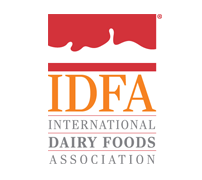
WASHINGTON, March 22, 2017 /PRNewswire-USNewswire/ — Michael Dykes, D.V.M., president and CEO of the International Dairy Foods Association (IDFA), testified today before the House Committee on Agriculture about dairy policy and its impact on potential provisions in the 2018 Farm Bill. Dykes said that IDFA’s top priority is to enhance demand for U.S. dairy products—both at home and in the global market.
“First and foremost, the dairy industry needs better mechanisms for risk management – and that’s on both the farm and processor side,” Dykes said. Dykes pointed out that processors could also benefit from better tools to protect against the negative impact of price volatility on the U.S. dairy industry.
“Just as farmers are now looking to improve the Margin Protection Program and the Livestock Gross Margin insurance program, dairy manufactures also need access to effective risk management tools in this farm bill,” said Dykes. “Forward contracting has provided an important mechanism for manufacturers to directly contract with individual farmers or their cooperatives at a fixed price to reduce price volatility. This program should now be expanded to include all classes of milk and be made permanent.”
Dykes said that IDFA will work collaboratively with National Milk Producers Federation to improve risk management for both farmers and processors.
The global marketplace is critical, Dykes noted, as that is where the U.S. dairy industry can expect the most potential growth.
“Exports are driving growth in demand for U.S. farm milk,” said Dykes.
Dykes testified that Mexico is the number one export market for U.S. dairy, accounting for one-fourth of total dairy exports. “We need to ensure that a renegotiation of NAFTA preserves our important Mexico market and gains increased access to the Canadian market,” said Dykes.
Dykes also said that the Asia-Pacific region, already the world’s largest market for food and agriculture, is expected to double by 2050. “Reducing and eliminating tariffs and other restrictive agricultural policies in this region will allow our dairy industry to compete,” said Dykes.
On the domestic side, Dykes noted that only 1 out of every 10 Americans consumes the recommended 3 servings of dairy a day as recommended by the 2015 Dietary Guidelines. To address this shortfall and encourage more dairy consumption, Dykes advocated for voluntary incentives under the Supplemental Nutrition Assistance Program (SNAP) and more school milk options.
“We believe adding voluntary incentives to encourage SNAP participants to increase their consumption of milk and dairy foods would be not only nutritionally sound but a wise use of taxpayer dollars,” said Dykes.
Dykes also said that dairy foods represent the second-largest and fastest-growing category of organic foods sales, totaling about $6 billion or 15 percent of all organic sales.
“We believe maintaining the National Organic Program (NOP) as it is currently managed will ensure that consumers have access to organic dairy products and accommodates the continued growth of the organic dairy industry,” said Dykes.
Dykes’ full testimony is available here.
The International Dairy Foods Association (IDFA), Washington, D.C., represents the nation’s dairy manufacturing and marketing industries and their suppliers with a membership of nearly 525 companies within a $125-billion a year industry. IDFA is composed of three constituent organizations: the Milk Industry Foundation (MIF), the National Cheese Institute (NCI) and the International Ice Cream Association (IICA). IDFA’s nearly 200 dairy processing members operate more than 600 manufacturing facilities and range from large multi-national organizations to single-plant companies. Together they represent more than 85 percent of the milk, cultured products, cheese, ice cream and frozen desserts produced and marketed in the United States. Visit IDFA at www.idfa.org.
SOURCE International Dairy Foods Association







